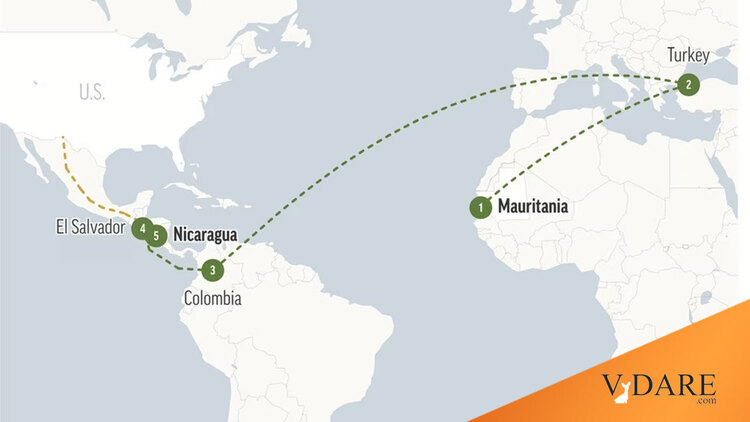


By Steve Sailer
08/25/2023
I asked Google’s new Generative AI search tool twice what the population of the Sahel is — the habitable unforested stretch south of the Sahara — and was told it’s either 135 million or 414 million. Thanks, AI!
In any case, it’s growing fast. From the Associated Press:
Thousands more Mauritanians are making their way to the US, thanks to a route spread on social media
BY JAKE OFFENHARTZ, PATRICK ORSAGOS AND RENATA BRITO
Updated 6:28 AM PDT, August 19, 2023CINCINNATI (AP) — Aissata Sall was scrolling through WhatsApp in May when she first learned about the new route to the United States. For Ibrahima Sow, the discovery came on TikTok a few weeks later.
By the time their paths crossed at the tidy one-story brick house in Cincinnati, they had encountered hundreds of other Mauritanians, nearly all of them following a new path surging in popularity among younger migrants from the West African nation, thanks largely to social media.
“Four months ago, it just went crazy,” said Oumar Ball, who arrived in Cincinnati from Mauritania in 1997 and recently opened his home to Sow, Sall and more than a dozen other new migrants. “My phone hasn’t stopped ringing.”
The spike in migration was made possible by the discovery this year of a new route through Nicaragua, where relaxed entry requirements allow Mauritanians and a handful of other foreign nationals to purchase a low-cost visa without proof of onward travel.
It’s almost as if El Presidente of Nicaragua, elderly 1980s Sandinista Daniel Ortega, has his reasons to harm the United States.
As word of the entry point spreads, travel agencies and paid influencers have taken to TikTok to promote the trip, selling packages of flights that leave from Mauritania, then connect through Turkey, Colombia and El Salvador, and wind up in Managua, Nicaragua.
To my mind, asylum and refugeedom should be for neighbors. For example, if a colossal hurricane devastates the Bahamas, which is about 100 miles from Florida, I’d be fine with taking in some Bahamians for a while because America is the closest neighbor of the Bahamas.
From there, the migrants, along with asylum seekers from other nations, are whisked north by bus with the help of smugglers. …
“We wish you success. Nicaragua loves you very much,” a man working for a travel agency says in Spanish in another video.
The influx of Mauritanians has surprised officials in the U.S. It came without a triggering event — such as a natural disaster, coup or sudden economic collapse —
Mauritania is a perennial contender for the iSteve World’s Worst Country title. It’s an interesting sub-Saharan country in that it is ruled by more or less whites oppressing more or less blacks. But it’s also a pretty hideous one.
Recently, The New York Times celebrated Mauritania for having a pro-divorce culture, but slavery is still widely practiced there and the “White Mauritanians” who rule over, and often enslave, the “Black Mauritanians” are into a fatness fetish in which they force-feed girls to make them obese.
suggesting the growing power of social media to reshape migration patterns: From March to June, more than 8,500 Mauritanians arrived in the country by crossing the border illegally from Mexico, up from just 1,000 in the four months prior, according to U.S. Customs and Border Protection data.
… Some who left say they’re again fleeing state violence directed against Black Mauritanians. Racial tensions have increased since the May death of a young Black man, Oumar Diop, in police custody, with the government moving aggressively to crush protests and disconnect the country’s mobile internet. …
The nation was one of the last to criminalize slavery, and the practice is widely believed to persist in parts of the country. …
The trip can cost $8,000 to $10,000, a hefty sum that some families manage by selling land or livestock.
In other words, Mauritanian immigrants to the U.S. are pretty rich by Mauritanian standards. Of course, there is no way that America could possibly solve the poverty problem of the world’s other 7.5 billion people.